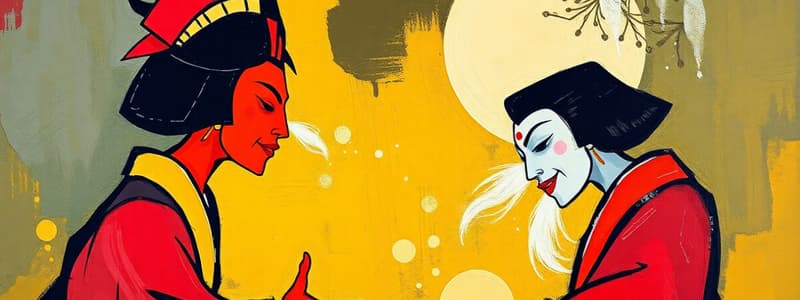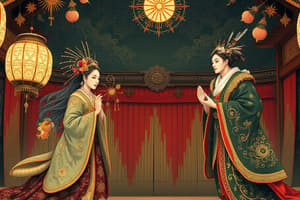Podcast
Questions and Answers
What is the primary role of the waki actor in Nō plays?
What is the primary role of the waki actor in Nō plays?
- To play musical instruments
- To represent the audience
- To explain the circumstances of the play (correct)
- To perform the central dance
The stage of a Nō play is open on all sides.
The stage of a Nō play is open on all sides.
False (B)
What is the name of the principal actor in Nō plays?
What is the name of the principal actor in Nō plays?
shite
The musicians for a Nō play sit in the recess at the back of the stage, with the ___________ nearest to the gallery.
The musicians for a Nō play sit in the recess at the back of the stage, with the ___________ nearest to the gallery.
Match the roles in Nō plays with their descriptions:
Match the roles in Nō plays with their descriptions:
How many main actors does a typical Nō play use at a minimum?
How many main actors does a typical Nō play use at a minimum?
In Nō plays, female roles are performed by women.
In Nō plays, female roles are performed by women.
What is the primary function of the Chorus in Nō theater?
What is the primary function of the Chorus in Nō theater?
What is the name of the gallery leading to the green-room in a Nō performance?
What is the name of the gallery leading to the green-room in a Nō performance?
The shite always wears a mask when playing any character.
The shite always wears a mask when playing any character.
What type of percussion instrument is typically played by the drummer nearest to the gallery?
What type of percussion instrument is typically played by the drummer nearest to the gallery?
The Nō stage properties are represented by four posts covered with a __________.
The Nō stage properties are represented by four posts covered with a __________.
During a Nō play, what is the typical number of movements in the shite's dance?
During a Nō play, what is the typical number of movements in the shite's dance?
Match the following Nō theater roles with their descriptions:
Match the following Nō theater roles with their descriptions:
The flute in Nō theater is played continuously throughout the performance.
The flute in Nō theater is played continuously throughout the performance.
What is the term used for the slow dance that consists of solemn gestures in a Nō play?
What is the term used for the slow dance that consists of solemn gestures in a Nō play?
What was the primary characteristic of the chanting in Nō-plays?
What was the primary characteristic of the chanting in Nō-plays?
The verse in Nō-plays is strictly consistent and follows a single pattern of syllables.
The verse in Nō-plays is strictly consistent and follows a single pattern of syllables.
What was Nō-plays originally called?
What was Nō-plays originally called?
The 14th century Nō-writer, __________, emphasized the careful use of pivot-words.
The 14th century Nō-writer, __________, emphasized the careful use of pivot-words.
Match the following elements to their descriptions:
Match the following elements to their descriptions:
What is a common feature found in the lyric portions of Nō-plays?
What is a common feature found in the lyric portions of Nō-plays?
Nō-plays utilize less existing literary material compared to Western dramatists.
Nō-plays utilize less existing literary material compared to Western dramatists.
Which century did Nō-plays begin to take form?
Which century did Nō-plays begin to take form?
Flashcards
Expanding Five-Line Poems
Expanding Five-Line Poems
A method of expanding a five-line poem into a longer piece of writing in order to make it more understandable.
Kurai (Mood)
Kurai (Mood)
The distinct mood or character of a Nō play, similar to the tone or feeling of a Shakespearean play.
Shite
Shite
The main actor in a Nō play who performs the central dance.
Waki
Waki
Signup and view all the flashcards
Nō Stage Design
Nō Stage Design
Signup and view all the flashcards
Hashigakari
Hashigakari
Signup and view all the flashcards
Nō Play Seating
Nō Play Seating
Signup and view all the flashcards
Nō Actors
Nō Actors
Signup and view all the flashcards
Chorus
Chorus
Signup and view all the flashcards
Masks in Noh
Masks in Noh
Signup and view all the flashcards
Noh Dance (Mai)
Noh Dance (Mai)
Signup and view all the flashcards
Properties in Noh
Properties in Noh
Signup and view all the flashcards
Hand Drummer
Hand Drummer
Signup and view all the flashcards
Five Movements in Noh
Five Movements in Noh
Signup and view all the flashcards
The Flute in Noh
The Flute in Noh
Signup and view all the flashcards
Nō Chanting
Nō Chanting
Signup and view all the flashcards
Pivot Words in Nō Plays
Pivot Words in Nō Plays
Signup and view all the flashcards
Literary Material in Nō Plays
Literary Material in Nō Plays
Signup and view all the flashcards
Sarugaku
Sarugaku
Signup and view all the flashcards
Sarugaku no Nō
Sarugaku no Nō
Signup and view all the flashcards
Nō Verse
Nō Verse
Signup and view all the flashcards
Origins of Nō
Origins of Nō
Signup and view all the flashcards
Borrowing in Nō Plays
Borrowing in Nō Plays
Signup and view all the flashcards
Study Notes
Noh Plays
- Japanese theatrical form, developed in the 14th century
- Expansive use of poetry in plays
- Utilizes elaborate costumes and masks
- Primarily male performers playing both male and female roles
- Actors use a stylized dance accompanied by music (drums, flute)
- Chorus assists by singing while actor acts
- Properties highly conventionalized; e.g., a boat represented by an open framework
- Plays often adapted from existing dance ballads and poems
- Emphasizes a sense of place and mood rather than specific plot
- Origins blend from various sources such as Shintō ceremonies, acrobatics, Chinese dances, and recitation. Importantly, the sources include Sarugaku, Dengaku, and dance-ballads.
- Play structure includes prose and verse, not fully separated, and often chanting or song-like elements
- Uses conventional, stylized acting and dance
Noh Stage
- Stage roughly 18 feet square
- Back wall features a painted pine tree
- Open sides for audience to watch from multiple angles
- Gallery to greenroom, open curtain separates the area
- Recess for instruments and chorus
- Roof imitating Shinto temple structure
- Audience sits on multiple sides
Noh Performers and Actors
- Waki (assistant) explains circumstances to the shite (principal character)
- Female roles performed by men
- Chorus (8-12) sings the actors lines when they cannot sing themselves due to movement needs or speaking demands of the plays
- Musicians include a stick-drum, hand-drummers (one with thimbles), and flute
- Shite (principal actor) wears a mask, particularly for women or very old men; younger, male warriors, however, do not wear masks
Noh Costume
- Highly elaborate and gorgeous costumes are essential to effects
- Actors wear masks for certain roles (women, old men)
- Young men and warriors typically do not wear masks
Studying That Suits You
Use AI to generate personalized quizzes and flashcards to suit your learning preferences.




